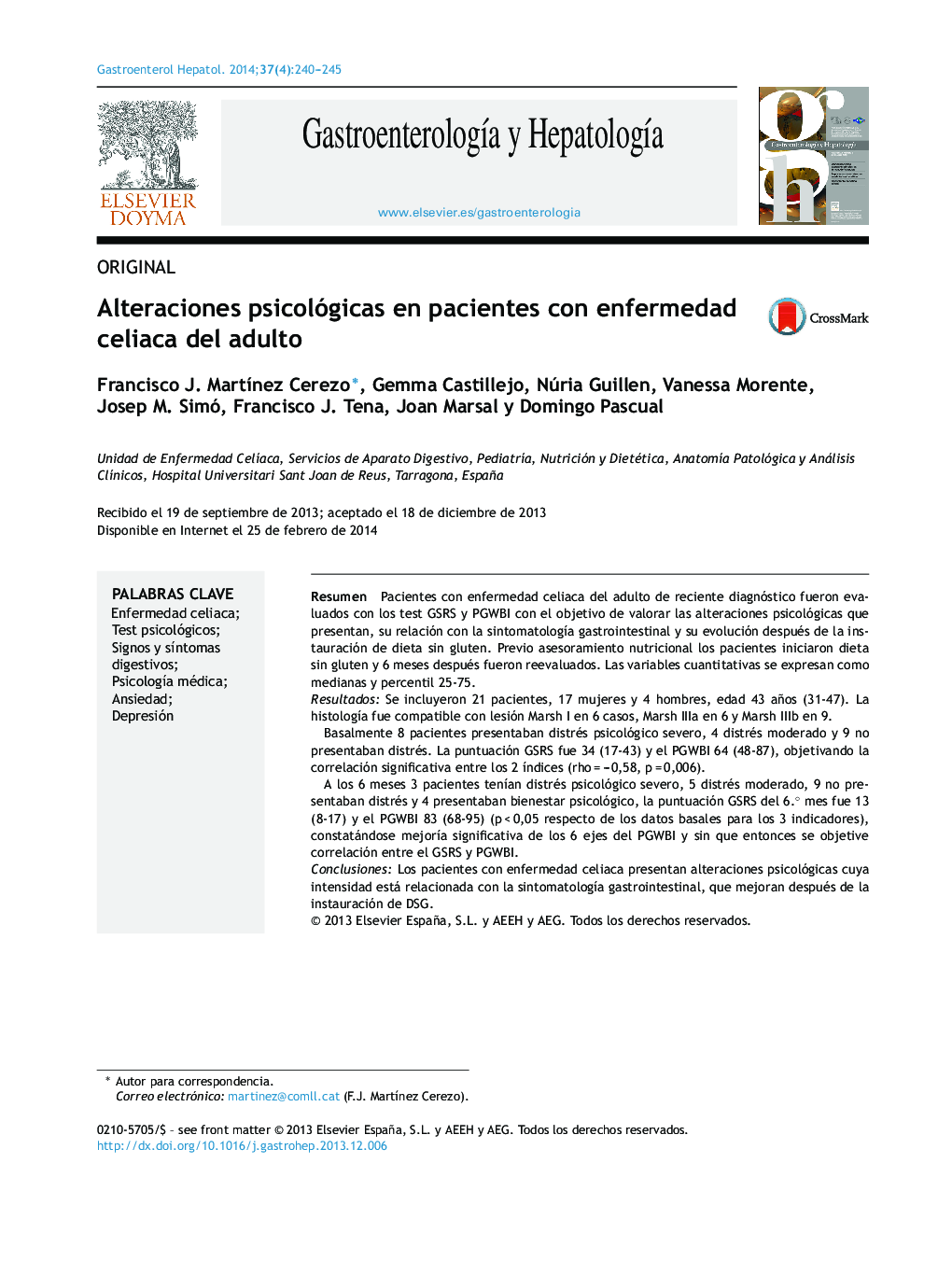| Article ID | Journal | Published Year | Pages | File Type |
|---|---|---|---|---|
| 3288155 | Gastroenterología y Hepatología | 2014 | 6 Pages |
ResumenPacientes con enfermedad celiaca del adulto de reciente diagnóstico fueron evaluados con los test GSRS y PGWBI con el objetivo de valorar las alteraciones psicológicas que presentan, su relación con la sintomatología gastrointestinal y su evolución después de la instauración de dieta sin gluten. Previo asesoramiento nutricional los pacientes iniciaron dieta sin gluten y 6 meses después fueron reevaluados. Las variables cuantitativas se expresan como medianas y percentil 25-75.ResultadosSe incluyeron 21 pacientes, 17 mujeres y 4 hombres, edad 43 años (31-47). La histología fue compatible con lesión Marsh I en 6 casos, Marsh IIIa en 6 y Marsh IIIb en 9.Basalmente 8 pacientes presentaban distrés psicológico severo, 4 distrés moderado y 9 no presentaban distrés. La puntuación GSRS fue 34 (17-43) y el PGWBI 64 (48-87), objetivando la correlación significativa entre los 2 índices (rho = –0,58, p = 0,006).A los 6 meses 3 pacientes tenían distrés psicológico severo, 5 distrés moderado, 9 no presentaban distrés y 4 presentaban bienestar psicológico, la puntuación GSRS del 6.° mes fue 13 (8-17) y el PGWBI 83 (68-95) (p < 0,05 respecto de los datos basales para los 3 indicadores), constatándose mejoría significativa de los 6 ejes del PGWBI y sin que entonces se objetive correlación entre el GSRS y PGWBI.ConclusionesLos pacientes con enfermedad celiaca presentan alteraciones psicológicas cuya intensidad está relacionada con la sintomatología gastrointestinal, que mejoran después de la instauración de DSG.
Patients with recently-diagnosed adult celiac disease were evaluated with the Gastrointestinal Symptom rating Scale (GSRS) and Psychological General Well-Being Index (PGWBI) to evaluate their psychological alterations, the association between any alterations and gastrointestinal symptoms, and their outcome after starting a gluten-free diet. The patients underwent nutritional assessment and then started a gluten-free diet; they were reassessed 6 months later. Quantitative variables are expressed as the median and 25th-75th percentiles.ResultsWe included 21 patients, 17 women and 4 mena, with a mean age of 43 years (31-47). The results of histological analysis were compatible with Marsh I lesions in 6 patients, Marsh IIIa in 6 and Marsh IIIb in 9.At baseline, 8 patients showed severe psychological distress, 4 showed moderate distress and 9 showed no distress. The GSRS score was 34 (17-43) and the PGWBI was 64 (48-87), with a significant correlation between the 2 indexes (rho = –.58, P = .006).At 6 months, 3 patients had severe psychological distress, 5 had moderate distress, 9 showed no distress and 4 showed psychological well-being. The GSRS score at 6 months was 13 (8-17) and the PGWBI was 83 (68-95) (P < .05 compared with baseline data for the 3 indicators). The 6 axes of the PGWBI showed significant improvement. At 6 months, no correlation was found between the GSRS and PGWBI.ConclusionsPatients with celiac disease have psychological alterations whose intensity is related to gastrointestinal symptoms. These symptoms improve after the start of a gluten-free diet.
